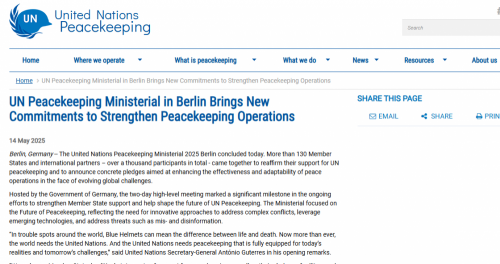Berlin, Germany -- The United Nations Peacekeeping Ministerial 2025 Berlin concluded today. More than 130 Member States and international partners – over a thousand participants in total - came together to reaffirm their support for UN peacekeeping and to announce concrete pledges aimed at enhancing the effectiveness and adaptability of peace operations in the face of evolving global challenges.
Hosted by the Government of Germany, the two-day high-level meeting marked a significant milestone in the ongoing efforts to strengthen Member State support and help shape the future of UN Peacekeeping. The Ministerial focused on the Future of Peacekeeping, reflecting the need for innovative approaches to address complex conflicts, leverage emerging technologies, and address threats such as mis- and disinformation.
“In trouble spots around the world, Blue Helmets can mean the difference between life and death. Now more than ever, the world needs the United Nations. And the United Nations needs peacekeeping that is fully equipped for today’s realities and tomorrow’s challenges,” said United Nations Secretary-General António Guterres in his opening remarks.
“We welcome Member States’ political statements of support for peacekeeping as well as their pledges of military and police capabilities, new partnerships and technological support. This meeting is also about something more fundamental: the future of peacekeeping itself,” he added.
“In an interconnected world, no nation can achieve peace and security for its citizens on its own. In the past two days, more than 130 UN member states have come together in Berlin, determined
to make progress towards this goal together. We all agree that setting up strong and effective peacekeeping missions is our joint responsibility. We want to tailor future missions to the exact needs of the host countries and increase their acceptance and effectiveness. This is the way forward in a world in which peacekeeping is more important now than ever before, but where the challenges are greater than at any time in the past. The participants have lived up to this challenge by making many very significant contributions. Germany’s support for the UN and its peacekeeping missions remains unwavering. We are committed to standing up for international peace and security,” said Johann Wadephul, Minister of Foreign Affairs of the Federal Republic of Germany.
Meanwhile, announcing his country’s pledged contributions worth 82 million Euros to UN Peacekeeping, Boris Pistorius, Minister of Defence of the Federal Republic of Germany, said: “I am grateful to all partners, who have come to Berlin to make significant pledges to ensure efficient global Peacekeeping Missions. Germany continues to be a steadfast supporter of UN Peacekeeping and has pledged contributions worth 82 million Euros. In addition, we will continue our support to missions and partners with training and equipment. Our goal was to focus on new and innovative pledges, ranging from renewable energy technologies to medical transport drones to the protection from improvised explosive devices. We remain committed to supporting the three UN Peacekeeping Missions that the German Armed Forces currently deploy to in South Sudan, Lebanon and Western Sahara.”
Key outcomes
A total of 74 Member States made pledges including:
Pledges of military and police units
- 53 Member States pledged uniformed capabilities, including 88 military and police units, as well as various critical capabilities, airlift, individual experts, staff officers and individual police officers.
- Specialized training
- 59 Member States pledged specialized trainings on critical issues such as peacekeeping-intelligence, protection of civilians, gender and the prevention of sexual exploitation and abuse.
Technological advancements and data-driven approaches
- 18 Member States made pledges related to technological advancements and data-driven approaches to improve mission effectiveness.
- Women, Peace and Security
- 38 Member States made pledges to further implement the Women, Peace and Security agenda, including gender-responsive peacekeeping and women in peacekeeping.
Safety and Security
- 16 Member States pledged capabilities and projects to enhance the safety and security of peacekeepers.
Conduct and accountability
- Eleven Member States made pledges related to the conduct and accountability of peacekeepers and UN Peacekeeping’s fight against sexual exploitation and abuse. This response includes targeted contributions to the Trust Fund for victims.
Strategic Communications and information integrity
- Eight Member States made pledges to support the UN’s Strategic Communications efforts and contribute resources to strengthen information integrity.
Background
Today, more than 61,000 military and police peacekeepers from 119 countries and more than seven thousand civilian personnel serve across 11 Peacekeeping Missions.
The Berlin Ministerial is part of a series of high-level meetings aimed at galvanizing political support and generating tangible commitments to improve UN Peacekeeping. It follows previous Ministerial meetings held in Accra (2023), Seoul (2021), New York (2019) Vancouver (2017) and London (2016). The 2025 Ministerial also coincides with the 80th anniversary of the United Nations and the 10-year anniversary of the Leaders' Summit on Peacekeeping.
More information on the meeting, including statements and the list of pledges, please visit the UN Peacekeeping website and @UNPeacekeeping digital channels.
For media inquiries and further information, please contact:
- Department of Peace Operations: Sophie Boudre: boudre@un.org; Hector Calderon: hector.calderon@un.org
- Federal Republic of Germany: Anna Laura Vitzinger, German Foreign Office: presse@diplo.de; and Sonja Momberg, German Ministry of Defence: sonjamomberg@bmvg.bund.de
******











